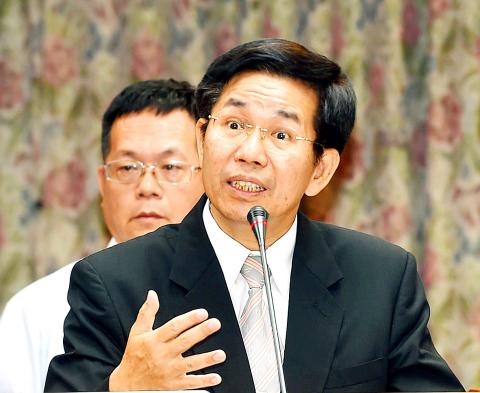Universities should move toward abolishing dormitory curfews by implementing diversified management rules, Minister of Education Pan Wen-chung (潘文忠) said yesterday.
Pan made the remarks during a question-and-answer session at a meeting of the legislature’s Culture and Education Committee, where several lawmakers asked questions about the controversy surrounding a student-led protest against a curfew that Fu Jen Catholic University imposed on female students living in dormitories.
The education minister initially refrained from giving a direct response when Democratic Progressive Party (DPP) Legislator Su Chiao-hui (蘇巧慧) asked his opinion on imposing curfews on female students, saying that universities have jurisdiction over the issue.

Photo: Fang Pin-chao, Taipei Times
DPP Legislator Rosalia Wu (吳思瑤) asked Pan to clarify his stance on the issue.
“Are such unreasonable access controls protecting female students, or are they putting them in greater danger?” Wu asked.
Pan said that the students are advocating total abolition of dormitory curfews, but that he thinks alternative management rules should be put in place before curfews are lifted.
When asked by DPP Legislator Hsu Chih-chieh (許智傑) how he would respond to students if he were the dean of Fu Jen, Pan said that he would probably issue identification cards to female students, granting them unlimited access to their dormitories via a card reader, provided that the time at which the students leave and return to their dormitories is recorded and forwarded to their parents.
Hsu showed a petition calling for the abolition of dormitory curfews at universities handed out by FJU Cinderella, a group formed by students opposed to the curfew, and asked Pan if he would sign it.
Pan said that he would if the language used in the petition were changed to: “I support abolishing dormitory curfews if accompanying measures are in place.”
In related news, Pan said that the ministry would form a new curriculum review committee comprising students, officials and experts within two months in accordance with a recently passed amendment to the Senior High School Education Act (高級中等教育法).
The new committee would be in charge of reviewing curriculum guidelines being drafted for a 12-year national education system, which are set to take effect in 2018.
Pan said that six draft proposals for the so-called “examination-enrollment corelative system” to be used in the 12-year national education system were discussed yesterday at a meeting of the Board of College Recruitment Commission, but that no conclusions had been reached.
The new testing system would come into effect in 2021, he said.

‘DENIAL DEFENSE’: The US would increase its military presence with uncrewed ships, and submarines, while boosting defense in the Indo-Pacific, a Pete Hegseth memo said The US is reorienting its military strategy to focus primarily on deterring a potential Chinese invasion of Taiwan, a memo signed by US Secretary of Defense Pete Hegseth showed. The memo also called on Taiwan to increase its defense spending. The document, known as the “Interim National Defense Strategic Guidance,” was distributed this month and detailed the national defense plans of US President Donald Trump’s administration, an article in the Washington Post said on Saturday. It outlines how the US can prepare for a potential war with China and defend itself from threats in the “near abroad,” including Greenland and the Panama

A wild live dugong was found in Taiwan for the first time in 88 years, after it was accidentally caught by a fisher’s net on Tuesday in Yilan County’s Fenniaolin (粉鳥林). This is the first sighting of the species in Taiwan since 1937, having already been considered “extinct” in the country and considered as “vulnerable” by the International Union for Conservation of Nature. A fisher surnamed Chen (陳) went to Fenniaolin to collect the fish in his netting, but instead caught a 3m long, 500kg dugong. The fisher released the animal back into the wild, not realizing it was an endangered species at

The High Prosecutors’ Office yesterday withdrew an appeal against the acquittal of a former bank manager 22 years after his death, marking Taiwan’s first instance of prosecutors rendering posthumous justice to a wrongfully convicted defendant. Chu Ching-en (諸慶恩) — formerly a manager at the Taipei branch of BNP Paribas — was in 1999 accused by Weng Mao-chung (翁茂鍾), then-president of Chia Her Industrial Co, of forging a request for a fixed deposit of US$10 million by I-Hwa Industrial Co, a subsidiary of Chia Her, which was used as collateral. Chu was ruled not guilty in the first trial, but was found guilty

DEADLOCK: As the commission is unable to forum a quorum to review license renewal applications, the channel operators are not at fault and can air past their license date The National Communications Commission (NCC) yesterday said that the Public Television Service (PTS) and 36 other television and radio broadcasters could continue airing, despite the commission’s inability to meet a quorum to review their license renewal applications. The licenses of PTS and the other channels are set to expire between this month and June. The National Communications Commission Organization Act (國家通訊傳播委員會組織法) stipulates that the commission must meet the mandated quorum of four to hold a valid meeting. The seven-member commission currently has only three commissioners. “We have informed the channel operators of the progress we have made in reviewing their license renewal applications, and